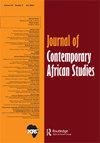酋长和地方政府行动者在应对气候变化方面的合作:来自加纳新华本的证据
IF 0.8
Q2 AREA STUDIES
引用次数: 0
摘要
体制障碍仍然是许多国家有效适应气候变化的制约因素。因此,在了解地方机构在跨部门和跨地区应对气候变化方面的能力和作用方面,还有很多需要改进的地方。我们从随机选择的酋长和地方政府行为体以及有目的地选择的市政议会官员中获取证据,研究了地方政府行为体与酋长等非正式机构之间的伙伴关系如何能够加强当地社区协调和综合的气候行动和适应规划。所有访谈都被记录下来,并在演绎代码生成的主题中进行分析。与会者展示了对气候变化的原因和影响的不同程度的知识。我们观察到,随着两个机构的行动者单独或协同实施一些适应和缓解行动,一些非结构化的气候变化活动在当地社区得到了实施。因此,我们的结论是,如果给予适当的关注,通过解决包括财政拨款、人员能力低下以及与地方机构、非正式机构和地方政府行为体对抗的各单位之间缺乏协调在内的问题,可以率先实施持久的气候变化适应和减缓方案,并在国家一级产生公平和可持续性。本文章由计算机程序翻译,如有差异,请以英文原文为准。
Collaboration between Chiefs and Local Government Actors in Combating Climate Change: Evidence from New Juaben, Ghana
Institutional barriers remain a constraint to efficient adaptation to climate change in many countries. Therefore, there is much to be desired regarding knowledge on the capacity and roles of local institutions in responding to climate change across sectors and locales. Drawing evidence from randomly selected chiefs and local government actors, and purposively selected officials of the Municipal Assembly, we examined how partnership between local government actors and informal institutions such as chieftaincy could enhance coordinated and integrated climate action and adaptation planning in local communities. All interviews were transcribed and analysed in themes generated from deductive codes. Participants demonstrated varied levels of knowledge on the causes and impacts of climate change. We observed the implementation of several unstructured climate change activities in local communities as actors of the two institutions individually and collaboratively implemented some adaptation and mitigation actions. We therefore conclude that when given the right attention, by addressing the problems which include financial allocation, low capacity of personnel, and the lack of coordination between units that confront the local institutions, informal institutions and local government actors, could spearhead lasting climate change adaptation and mitigation programmes, and produce equity and sustainability at the national level.
求助全文
通过发布文献求助,成功后即可免费获取论文全文。
去求助
来源期刊

Journal of Contemporary African Studies
AREA STUDIES-
CiteScore
2.20
自引率
0.00%
发文量
18
期刊介绍:
Journal of Contemporary African Studies (JCAS) is an interdisciplinary journal seeking to promote an African-centred scholarly understanding of societies on the continent and their location within the global political economy. Its scope extends across a wide range of social science and humanities disciplines with topics covered including, but not limited to, culture, development, education, environmental questions, gender, government, labour, land, leadership, political economy politics, social movements, sociology of knowledge and welfare. JCAS welcomes contributions reviewing general trends in the academic literature with a specific focus on debates and developments in Africa as part of a broader aim of contributing towards the development of viable communities of African scholarship. The journal publishes original research articles, book reviews, notes from the field, debates, research reports and occasional review essays. It also publishes special issues and welcomes proposals for new topics. JCAS is published four times a year, in January, April, July and October.
 求助内容:
求助内容: 应助结果提醒方式:
应助结果提醒方式:


